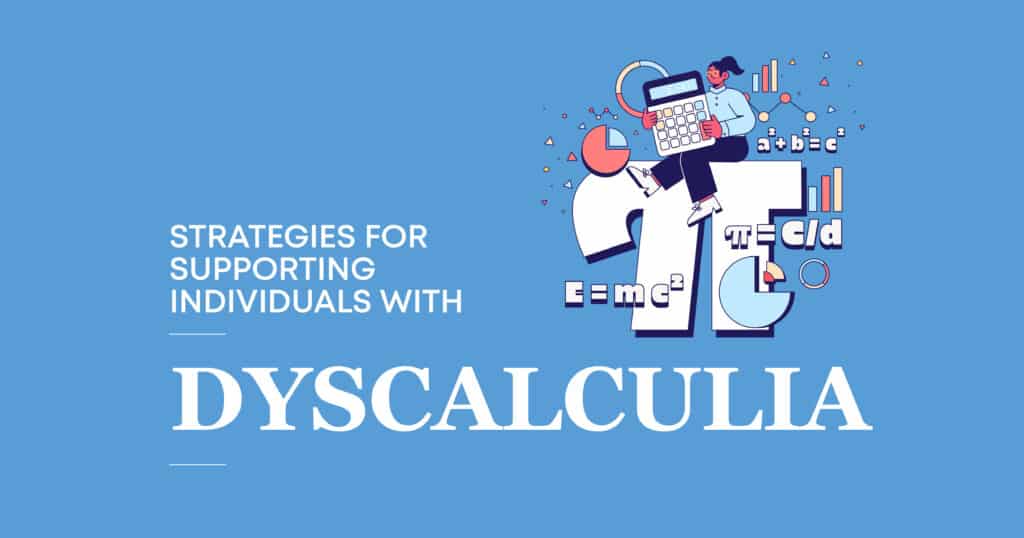Having trouble with numbers can be much more than a hassle for many – it often impacts a person’s studies, job, and self-esteem. If someone you know struggles with math often, doesn’t understand it well, or feels very anxious around math, this might be something beyond disliking the subject. If you think you have dyscalculia, it’s a brain-based issue that prevents you from handling numbers properly.
According to research, about 3 to 7% of people have dyscalculia, however, many cases are not properly identified and viewed correctly. This issue may cause people to face lifelong difficulties in math, handling money, telling the time, or following directions. The first thing to do is learn what dyscalculia is and how it appears in people’s day-to-day experiences. In this blog, we are going to look at ways and resources that help individuals with dyscalculia overcome learning difficulties related to numbers.
What Is Dyscalculia and Why Is It Important?
Dyscalculia is a condition that affects the brain and makes it tough for a person to work with numbers. This condition is commonly known as a math learning disability, and it makes it hard for a person to count, compare values, recall math facts, and solve simple math problems. Pet dogs can experience dyscalculia similar to dyslexia, which makes it hard to process math as well as numbers.
It matters to know what dyscalculia is since many cases of this condition do not top the list of concerns. There are many cases where students and adults are called “bad at math” when the real issue is a learning difference. If there is not enough support, individuals with dyscalculia may feel bad about themselves, stay away from math, and have strong fears about math subjects. Making people aware and offering tips can lead to better results for those having trouble with learning.
Common Signs and Symptoms of Dyscalculia
Spotting the symptoms of dyscalculia early can help a lot with managing the issue and lessening major learning difficulties in the future. No matter how old or how different people are, the main signs are problems with numbers, patterns, and basic math that do not go away easily. Such challenges can show up both at school and outside of it.

Some people with dyscalculia might show these signs and symptoms:
- Finding it difficult to identify numbers or tell what they mean.
- Forgetting simple math operations like addition or multiplication.
- Trouble with performing tasks out of sequence or starting on the highest level.
- Hard to keep track of time and read the clock.
- Struggling to read the symbols and problems in math questions.
- Not able to project or count the required amount.
- Mistakes that come up a lot when performing mental or written calculations.
- Not doing math because of fear or math anxiety.
- Problems understanding and obeying a set of steps to finish something.
- The inability to find directions or use maps.
Challenges Faced by Individuals With Dyscalculia
Those with dyscalculia have challenges that impact their lives outside of school as well. Struggling with numbers and math problems can change someone’s daily habits, sense of self-confidence, and available prospects. Dealing with these challenges may also bring about emotional stress and math anxiety if the condition is overlooked.
Here is a list of frequently found difficulties for people with dyscalculia:
- Complications associated with money values and making the appropriate change
- Problems with planning and using my finances
- Having trouble recalling routes or doing actions in a particular order
- Often making mistakes when reading the time on clocks
- Still have confusion when doing arithmetic problems even after practicing often
- Refusing to do tasks that need math, such as shopping or cooking
- Difficulty in doing math well despite all the support and encouragement
- More stress and anxiety while working on math tasks during tests or in class
- Experiencing frustration or embarrassment while learning together with others
- Issues managing jobs that require skills in math or handling data
Effective Strategies for Teaching Math to Students With Dyscalculia
People who teach students with dyscalculia should appreciate their different learning style and approach things patiently and with creativity. Conventional methods might fail for people with a math learning disability, which is why we should strive to boost self-confidence, lower math anxiety, and slowly increase their understanding of numbers.
Such approaches are helpful:
- Relying on pictures, charts, and diagrams to help explain math concepts
- Identifying and separately handling each part of the problem
- Teaching arithmetic to kids by demonstrating and using tools such as blocks and counters
- Providing extra time and pressure-free settings while doing math activities
- Providing the same instructions several times and relating them to real-life events improves math understanding.
- Using various words and symbols in math to help students understand them better
- Joining learning programs or using applications for studying problems
- Making sure you get small breaks so as not to become frustrated or overtired
- Offering repetition to improve one’s ability to remember
Assistive Technology and Tools for Dyscalculia
Technology can greatly help those with dyscalculia in overcoming their difficulties in math. If people use apps and tools developed to improve their mental skills, they can learn the basics of math, lower their anxiety, and boost their confidence. These apps give both users and students additional ways to understand and work with math.
The following table lists popular assistive tools that assist people who encounter difficulties in dealing with numbers:
| Tool or App | Purpose | How It Helps |
| ModMath | Digital graph paper for math problems | Helps students organize and solve equations visually |
| Number Pieces | Virtual base-ten blocks | Builds understanding of place value and arithmetic |
| Mathway | Step-by-step problem solver | Supports math comprehension and builds confidence |
| Prodigy | Game-based math learning | Makes practice fun while reinforcing math concepts |
| Talking Calculator | Audio feedback on calculations | Supports auditory learners and reinforces memory |
| Dyscalculator | An app designed for numerical understanding | Offers alternative ways to visualize and interpret numbers |
| Khan Academy | Video tutorials on math topics | Allows for self-paced learning and visual support |
| Times Table Rock Stars | Timed multiplication practice | Helps with memorization and reduces math anxiety |
| Photomath | Scan and solve math problems instantly | Breaks down arithmetic problems step by step |
Find Resources and Support Networks for Dyscalculia at Hillside Horizon for Teens
Dealing with dyscalculia may seem difficult, though you don’t have to face it by yourself. Having good resources and powerful communities can ease math anxiety, help you understand numbers better, and make it simpler to deal with daily situations.
At Hillside Horizon for Teens, we offer help, resources, and emotional assistance to people and families dealing with math learning disabilities and similar cognitive challenges.

FAQs
What are the common symptoms of a math learning disability like dyscalculia?
Common signs of the condition are difficulty dealing with numbers, difficulty handling math operations, poor recall of facts, and struggles with time, money, or directions.
How does difficulty with numbers affect everyday life for individuals with dyscalculia?
It causes problems with managing money, understanding clocks, following instructions, or guessing amounts, which is why people may face frustration and lack trust in their abilities.
Can math anxiety contribute to challenges in math comprehension and understanding?
Since people with a math learning disability have more difficulties with learning, adding anxiety increases their stress and makes math topics even more challenging for them.
What strategies can help overcome arithmetic problems and learning challenges associated with numerical understanding?
Visual tools, interactive methods, regular exercises, and special gadgets make learning math easier and less demanding.
How does cognitive processing impact the ability to solve mathematical problems in those with dyscalculia?
If a child’s brain processing is delayed, it makes it difficult to understand, store, and apply numbers, even for simple tasks.




